Jason Bateman, Charlie Day, Jason Sudeikis Horrible Bosses
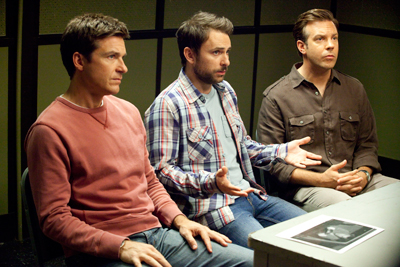
Horrible Bosses
Cast: Jason Bateman, Charlie Day, Jason Sudeikis, Jennifer Aniston, Colin Farrell, Jamie Foxx, Kevin Spacey, Julie Bowen, Donald Sutherland
Director: Seth Gordon
Genre: Drama, Comedy
Synopsis: For Nick, Kurt and Dale, the only thing that would make the daily grind more tolerable would be to grind their intolerable bosses into dust. Quitting is not an option, so, with the benefit of a few-too-many drinks and some dubious advice from a hustling ex-con, the three friends devise a convoluted and seemingly foolproof plan to rid themselves of their respective employers... permanently. There's only one problem: even the best laid plans are only as foolproof as the brains behind them.
Jason Bateman, Jason Sudeikis and Charlie Day play the three hapless workers, while Kevin Spacey, Colin Farrell and Jennifer Aniston are their unbearable bosses. Jamie Foxx appears as the con, whose street cred is priced on a sliding scale.
Release Date: 25th of August, 2011
About the Production
The Problem
These three pieces of $%# are going to die eventually anyway. We'd just be accelerating that natural process. - Kurt.
"Almost everyone has had a horrible boss at some point in their lives, someone who made life miserable," says director Seth Gordon. "We all know how tempting it is to fantasise about how much better things would be if they were out of the way. This is a story about three guys who decide to do something about it."
"But, - he adds, "it doesn't turn out exactly the way they expect."
If bumping off their tormentors seems a little extreme at first, it soon becomes clear that, for one reason or another, these three browbeaten and manipulated workers are out of reasonable options. And it's not as if they started out as homicidal malcontents actually, quite the opposite. Seth Gordon sees the story's heroes, played by Jason Bateman, Charlie Day and Jason Sudeikis, as "just average suburban working Joes. They're not bad guys, really; they're doing their best, but they're trapped and victimised by the people they work for in ways that are truly heinous and profound until they just can't take it anymore."
Week after week, longtime buddies Nick, Dale and Kurt meet for a few rounds to commiserate over their distinctly different yet equally desperate predicaments and the individuals responsible: Dave Harken, Nick's control-freak boss, played by Kevin Spacey; Bobby Pellit, the unconscionable heir to his father's company and the bane of Kurt's existence, played by Colin Farrell; and Dr. Julia Harris, the predatory dentist, played by Jennifer Aniston as audiences have never seen her before. As the conversation (and the beer) takes its natural course, the guys end up reflecting on how much brighter their lives and careers would be if only their despicable bosses were out of the picture. How nice it would be if they turned up dead one day. How much they deserve to turn up dea....
From there, it's not that great a leap. Or so they think.
The problem is, apart from their outrage, their furtive fantasies and the knowledge gleaned from umpteen seasons of Law & Order, they have no qualifications, no experience and certainly no aptitude for the assassination business. "They're completely incompetent," states Seth Gordon, a fact that is brought home to them immediately, and pretty much every hour thereafter, and which prompts them to enlist the bargain-priced assistance of a self-promoting parolee named Dean MF' Jones, played by Jamie Foxx.
From that springboard, "It becomes a linear story where one thing sets off another, and it just keeps getting faster and crazier as the guys quickly reach the point where there's no turning back," explains the director, who cites Horrible Bosses as one of those rare scripts that made him laugh till he cried.
If the average moviegoer can't relate to a murder plot, however ill-conceived, the filmmakers feel it's a safe bet they can at least relate to the escalating frustration that finally pushes these three working stiffs over the edge. Producer Brett Ratner, who developed Horrible Bosses with producing partner Jay Stern, notes, "The title alone says it all. It got an immediate reaction from everyone who heard it. People don't want to admit that the person they work for now is a horrible boss, but they'll refer to former bosses, or tell us about their 'friend' who has one. Everyone has bad experiences to draw on, and that's why this is so much fun."
"Actually, in discussing the movie, I discovered that a lot more people have wanted to kill their bosses than I would have guessed," offers Jason Sudeikis, who stars as the normally easygoing Kurt. In that respect, Horrible Bosses is a tale of wish-fulfillment on a grand scale for anyone who has ever imagined, say, heaving his or her immediate supervisor off the roof, but with Nick, Dale and Kurt taking all the risks and making all the stupid mistakes.
"They carry the water for us," says producer Jay Stern. "These are tough times for a lot of people, and many of us feel thankful to even have a job. At the same time, if someone is oppressing or abusing you, you think, 'Do I really have to take this? Do I really have to deal with this maniac?' I think there are plenty of people who don't necessarily want to kill their bosses but wouldn't mind seeing them hang off an overpass for awhile during rush hour."
"When these guys decide to take revenge in the most extreme way, it might seem a little dark at first," Jay Stern continues, "but they screw it up so badly that it's not really a movie about three workers who get off on killing their bosses; it's more about the outrageous and hilarious adventure they take together after they decide to empower themselves and end up getting involved in something way over their heads."
Starring as the beleaguered Nick, Jason Bateman concurs: "This is not exactly rational behavior and I hope there's no one like these guys out there. We're just trying to make people laugh. If they find a correlation between the story and their own lives, great. But I wouldn't advise trying any of this at home."
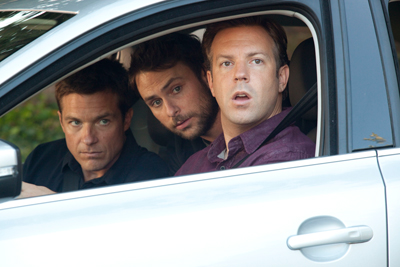 To do the story justice, the filmmakers took an uninhibited approach to Horrible Bosses and let the humor -and everything else - fly. Says Brett Ratner, "The movie doesn't pull any punches. We really went for it. Seth Gordon came in with a very strong point of view and a great vision for the casting and the execution. He knew what the movie needed to be, tonally, and he really delivered. It's a fine line between creating real stakes and real danger, and making it fun and funny. What I like most is that it never feels as though the jokes are there just for the sake of jokes. The humor always comes from character, and from the circumstances, and everything is grounded in the real world."
To do the story justice, the filmmakers took an uninhibited approach to Horrible Bosses and let the humor -and everything else - fly. Says Brett Ratner, "The movie doesn't pull any punches. We really went for it. Seth Gordon came in with a very strong point of view and a great vision for the casting and the execution. He knew what the movie needed to be, tonally, and he really delivered. It's a fine line between creating real stakes and real danger, and making it fun and funny. What I like most is that it never feels as though the jokes are there just for the sake of jokes. The humor always comes from character, and from the circumstances, and everything is grounded in the real world." "People just want to go to work, be treated with respect, and go home. Is that too much to ask?" screenwriter Michael Markowitz wants to know. Michael Markowitz also gets a story credit on the film and confirms that 'Horrible Bosses' was largely inspired by his own office experiences. "Writing this was my revenge."
What audiences should keep in mind, lest they judge too harshly, is that "these guys are fighting for their dignity. They need to do what it takes to stand up and be men," says screenwriter John Francis Daley. Referring to one scene in which this spirit is vigorously demonstrated, his writing partner Jonathan Goldstein adds, "and if it means sticking a toothbrush up your butt to maintain that dignity, well so be it."
"There are probably more appropriate movies to see if you're looking for heart-warming growth," admits Charlie Day, who stars as the timid but ultimately tenacious Dale.
The bottom line, Seth Gordon states, "is there's really no message here. It's just a fun, rude, escapist comedy about three guys who decide to kill their bosses and are out of their depth as soon as they start."
The Plan
I don't care how much we hate our bosses. We're not murderers. - Dale
You've never heard of justifiable homicide? It would be immoral NOT to kill them. - Kurt
Seth Gordon acknowledges it's the undeniable chemistry between the film's leads "often referred to on set as Charlie Day & the two Jasons that really propels the action. We got very lucky with this incredible synergy and these three accomplished comic actors who adapted to each others' rhythms so perfectly and worked so wonderfully together."
That camaraderie is key as Nick, Dale and Kurt try to brainstorm ideas and bolster one another's resolve in the face of everything they're up against. And for Dale, up against, literally means his boss's hands and any part of his body within reach.
As the unwilling prey of the sex-crazed Dr. Julia Harris, who can't seem to keep her lab coat buttoned up when he's in the room, "Dale is the hopeless romantic of the group," says Charlie Day. "He's desperately in love with his fiancée and just wants to be a good guy but his boss is constantly coming on to him. Sometimes even his buddies don't quite sympathise with him."
"I've never played a character so inexcusably raunchy and there was no way I could resist it , the dialogue and the situations are so outrageous and fun. I jumped at it immediately," says Jennifer Aniston, who calls the movie "a guilty pleasure for people unhappy in their jobs, to maybe go and get it out of their system by rooting for these guys."
"It really stretches the limits and crosses boundaries and Dr. Harris is way out in front on all counts: guilty as charged," she adds.
"What I love about the character is how masculine she is in her sexual appetite. As Jennifer Aniston and I discussed in rehearsals, Dr. Harris is a predator, like a lion. They don't feel one way or another, they just have to feed," says Seth Gordon. "It was really important to find an actress who could play Julia with all the intensity and delicious naughtiness the role deserves, and I thought it would be even better if it was someone audiences wouldn't expect. This is radically different from any role her fans have ever seen her in before and she just kills; you have to see it to believe it. It's electrifying to hear her deliver this dialogue. She's absolutely fearless and hilarious."
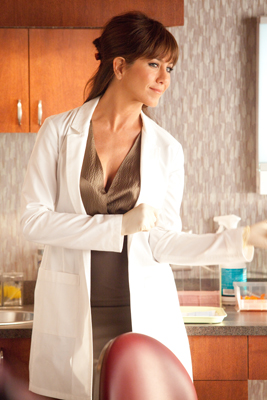 Jennifer Aniston previously starred with Jason Sudeikis in The Bounty Hunter and with Jason Bateman in last year's romantic comedy The Switch, but met Charlie Day for the first time on Horrible Bosses. Recalling the potentially awkward scenario of their first scene together, she says, "Within 20 minutes, I was straddling him in lingerie. But Seth Gordon never stopped laughing and we were all in perfect sync; if anything, after every take we'd be thinking, let's push it a little further. I was bizarrely comfortable in these scenes, almost more so than I would be playing the normal girl-next-door, and every scene was kind of crazy but that was really the fun of it."
Jennifer Aniston previously starred with Jason Sudeikis in The Bounty Hunter and with Jason Bateman in last year's romantic comedy The Switch, but met Charlie Day for the first time on Horrible Bosses. Recalling the potentially awkward scenario of their first scene together, she says, "Within 20 minutes, I was straddling him in lingerie. But Seth Gordon never stopped laughing and we were all in perfect sync; if anything, after every take we'd be thinking, let's push it a little further. I was bizarrely comfortable in these scenes, almost more so than I would be playing the normal girl-next-door, and every scene was kind of crazy but that was really the fun of it." Dale's friend Nick, meanwhile, faces a different kind of domination at the hands of his boss: the powerful, tightly wound VP Dave Harken, portrayed by Kevin Spacey, who lords over the cramped bullpen of Comnidyne Industries where poor Nick toils alongside his fellow corporate drones in the futile hope of reward and recognition… or, at the very least, an occasional half-day off.
"Dave Harken is the master of psychological torment," says Seth Gordon. "We imagined a kind of sophisticated passive-aggressive sadist, the kind of power-hungry micromanager that I think any of us can recognise because he exists out there in many forms, and Kevin handles it brilliantly."
Says Kevin Spacey, "You can't even give him the benefit of the doubt, or think for a minute that he's being tough in order to teach a lesson or encourage his employees to try harder and bring out their best. There are no underlying strategies that might redeem him. Dave Harken is just a bully. He's a terrible, terrible person."
"The three of us who play the bosses really back these three friends into a corner and I think audiences will completely understand why they're driven to kill us," Kevin Spacey concedes. "Fortunately, everything they set out to do doesn't go the way they plan in any way, shape or form. They make the worst decisions ever."
As Dave Harken's long-time subordinate and number-one target, Nick has certainly paid his dues into the next century, notes Jason Bateman. "Nick is dedicated and ambitious and wants a promotion so badly he can taste it. Dave Harken has promised it, but we know it's never going to happen. It's just part of his plan to dominate and emasculate."
By comparison, conditions for Kurt seem much better at least initially. As the story opens he's working for kindly Jack Pellit, played by Donald Sutherland as a man of warmth and integrity. "Jack is the kind of boss we all wish we had," states Seth Gordon. "We wanted an actor who could play that sort of father-figure role, the benevolent authority you want in your life, and Donald Sutherland was perfect. Seeing him interact with Jason Sudeikis, you really get the sense that these two characters have mutual respect and a rich history."
But that ideal situation can't last. Jack is soon out and Bobby Pellit, the son who replaces him, is one wormy acorn that fell a very long way from the tree.
"Bobby Pellit represents the sort of corrupt and incompetent jerk who's in charge of things but clearly has no idea what he's doing. Of course, he will find a way to blame his inevitable failures on someone else," says Seth Gordon.
"Playing Pellit was all about channeling my inner douche," laughs Colin Farrell. "This guy thinks he's God's gift to women, God's gift to intellect, to humor, to the club scene, to everything. It's all part of his grandiose sense of self-esteem, which is probably masking a deeper sense of being a disappointment to his father and being riddled with envy over the relationship his father had with Kurt, and all kinds of other things. With Pellit, Seth Gordon gave me complete license to act as pathologically screwed up as possible."
Colin Farrell also contributed significantly to Pellit's look, suggesting the comb-over and pot belly, as well as his affinity for the Chinese dragons that decorate his clothing to suggest to the world that he may have martial arts training. "Colin Farrell transformed himself so completely he's barely recognisable," Seth Gordon attests. "He fully went for it. Audiences are going to see a whole different and very funny side to him."
For Kurt, Pellit's sudden promotion is bad news. Jason Sudeikis explains: "First of all, Pellit hates Kurt because he knows his own father favored Kurt over him, so he makes it his mission to tank the business the two of them worked so hard for. Also, since all he cares about is money to fund his idiotic lifestyle, he's going to hurt thousands of people by dumping toxic chemicals because of some loophole that makes it legal, but still immoral. So, the way Kurt sees it, killing him would be doing God's work as well as his own. It's actually quite benevolent when you look at it that way."
That goes double for Dale, and triple for Nick. But can they pull it off? As Charlie Day points out, "These three aren't exactly criminal masterminds."
At least they're smart enough to know they need help. Enter MF Jones, an ex-con with a one-of-a-kind moniker, a flair for the dramatic and a special expertise he's willing to share for the right price… as soon as he decides what that might be.
"Jones is kind of a self-described murder consultant, the killer confidante," Jamie Foxx reveals. "These guys come into a bar, looking for a hit man. He overhears their conversation and, knowing that they're gullible dumbasses, sees an opportunity to make some money. So he scares them a little and tells them what they want to hear."
Calling Jones 'an entrepreneur,' Seth Gordon says, "Jamie Foxx puts some amazing details and gestures into his performance. He's a real master."
Jamie Foxx worked with the director, and costume designer Carol Ramsey, to perfect Jones' look, starting at the top. It was his idea to go with full-scalp tattoos as something, he notes, "not a lot of people have seen and not a lot of people are doing. Then we got retro with the clothes, the pointy-toe boots and things like that, because this is a guy who maybe went to jail for a minute and now he's living in his own time capsule. When he got out he went right back to the clothes he thought were hot when he went in."
The tattoos took an hour and a half to apply. Jamie Foxx recalls, "I went out once and people took a couple of pictures and it was all over the Internet, like =Jamie Foxx has lost his mind.' But it really serves the character and that's the kind of reaction you want."
Following their meeting with Jones, things pick up speed as the guys quickly discover how far they're willing to go. "They kind of get swept up into this cockamamie plan that they didn't really think through before it just started to happen," says Jason Bateman. "It immediately gets out in front of them. Every time they get close to pulling it off, it falls apart, and then every time they want to walk away, something falls into place. The three of us together are like one character. The writers did a great job of creating this three-headed beast."
For Charlie Day, "If Dale is the romantic, Kurt is the opposite, a ladies' man to a fault. Nick shoots right down the middle, a straight-and-narrow, buttoned-up kind of guy. It's entertaining to watch these three different personalities, sort of left, right and center, trying to find their way through this situation together. It's all Freud. It's like the Id, the Ego and the Superego."
"That's a little too smarty-pants for me and is clearly something someone told Charlie Day to say", Jason Sudeikis tosses back. "But it does make sense. It's a case of three mouths and one brain, for sure. Dale doesn't want to kill anyone; he's the last one in. Nick is more the audience's point of view, the one closest to neutral, and Kurt is the hapless Id, the one who gets the ball rolling."
Horrible Bosses also stars Julie Bowen as Rhonda, the impeccable Mrs. Harken, who, the actress suggests, "may or may not be a hussy. By keeping her deeply suspicious husband on edge at home, imagining her with every man in sight, she makes it that much tougher for his employees to deal with him at the office."
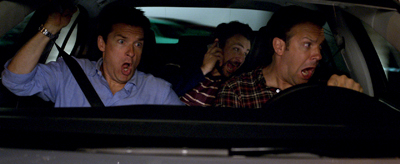 Lindsay Sloane appears as Dale's fiancée Stacy, blissfully unaware of his troubles at work even when they land in her lap; and P.J. Byrne as Kenny Sommerfeld, a former investment manager now scrounging for drinks, whose riches-to-rags example reminds Nick, Dale and Kurt that good jobs are hard to find. Wendell Pierce and comedian Ron White play a pair of suspicious cops, and Ioan Gruffudd represents the three plotters' first big mistake, a man whose services they hire online before realising he's not at all the kind of professional they had in mind.
Lindsay Sloane appears as Dale's fiancée Stacy, blissfully unaware of his troubles at work even when they land in her lap; and P.J. Byrne as Kenny Sommerfeld, a former investment manager now scrounging for drinks, whose riches-to-rags example reminds Nick, Dale and Kurt that good jobs are hard to find. Wendell Pierce and comedian Ron White play a pair of suspicious cops, and Ioan Gruffudd represents the three plotters' first big mistake, a man whose services they hire online before realising he's not at all the kind of professional they had in mind. The Playing Fields
If someone approaches the house, give us a signal. - Nick
I'll honk the horn 6 times. - Dale
How about you just honk once? - Nick
As the guys put Jones' advice into action by staking out Harken's, Pellit's and Harris' homes at night, they see the full expression of their bosses' horribleness in ways unrealised at the office, leaving little doubt about the righteousness of their mission.
Production designer Shepherd Frankel, who first collaborated with Seth Gordon on the 2008 holiday hit Four Christmases, imagined the film's interlocking storylines like a large-scale game in which the bosses' home and office spaces together represent three playing fields. "It's like we have a team of three people playing against an opposing team of three, with the Jamie Foxx character as referee. We wanted to distinguish these three environments and play the two sides off each other. Each environment is a reflection of the person who controls it."
"Shepherd Frankel and I work hard to create settings that support all the conversations we've had with the actors about character, so we can put them into a world that feels like the person we've been discussing all along," says Seth Gordon
. Nick's hell is the Comnidyne bullpen, organised, per Shephard Frankel, "to enhance the discomfort and anxiety of lower-level employees clustered in the center of the room where every movement is monitored by the boss from his corner office. We met with financial strategists and management companies to learn the architecture and sociology of these layouts, to represent visually what it's like to start at the bottom and aspire to an office at the perimeter."
Thematically, Shephard Harken is perfectly aligned with his surroundings, as costume designer Carol Ramsey worked with Frankel and set decorator Jan Pascale to match his wardrobe to Comnidyne's cold grey and blue palette. The McMansion he calls home, though more lavishly decorated, is equally lacking in warmth and designed for show, right up to its laughably large mantlepiece portrait of Harken and his trophy wife posed with their prized cats.
For Dr. Harris' domain, the challenge was infusing a sensual vibe into arguably one of the least sexy places imaginable: a dental office. "She's a Type A professional at the top of her game, who likes to play cat-and-mouse, so it's a completely controlled environment, with apertures and views into other rooms so she always knows what's going on," the designer outlines. "It's highly designed, with rich wallpaper and tones, sumptuous artwork and subtle lighting - all very disarming till you step into her private office. The blinds close, the door locks and you think, 'It's the Temple of Doom."
The deviant doc's house is stylistically similar to her office that is, what can be seen of it through its wide street-facing picture windows, which afford her the opportunity to put on the kind of show she couldn't get away with at work.
The Pellit Chemical Company and Bobby Pellit's house are a jarring contrast to one another because the company reflects Pellit Senior's human touch, whereas Pellit Junior's home is a shameless shrine to himself and his hedonistic appetites. It features a mishmash of anything he finds exotic and erotic, mostly Egyptian and Asian motifs with an '80s Studio 54 vibe, a makeshift dojo, lots of mirrors and a massage table. Some of the detail, principally the Asian influence, was drawn from Seth Gordon and Colin Farrell's take on the character's infatuation with martial arts and his delusions of prowess.
The production filmed in and around Los Angeles, although, says Seth Gordon, "We tried to find great L.A. locations that people haven't already seen a hundred times in movies and on TV. The idea was for it to feel like it could be anywhere in America, where people are trying to pursue the American dream but getting stopped by a horrible boss."
Comnidyne was part of an existing office park building in Torrance, California, where the crew completely remade a vacant floor. For Pellit Chemical, they found the perfect industrial landscape of pipes and containers surrounding an unoccupied water cleaning and storage facility in Santa Fe Springs. The industrial setting and architecture were made-to-order but taking advantage of that meant giving the warehouse's interior a thorough gutting and overhaul, as well as cutting windows into concrete walls to showcase the site's dynamic exteriors and creating an entryway from which Kurt's former boss Jack Pellit makes his fateful exit. The bar where Nick, Dale and Kurt find their mentor, Jones, was staged in one of downtown Los Angeles' oldest neighborhoods, and a Woodland Hills T.G.I.F. restaurant was converted into the guys' favorite watering hole.
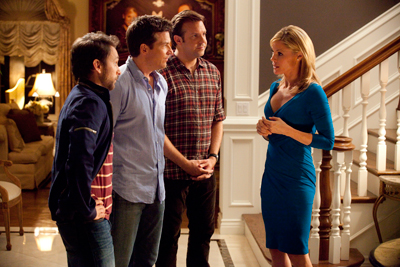 Using practical locations was part of Seth Gordon's intention to anchor the story to reality. But it's a heightened reality, where scenarios born in the real world are played out much further than they would be in the lives most of us lead. Possibly the most satisfying of these is a stunt involving the ample windows of Comnidyne's conference room, through which Nick imagines hoisting Harken, head-first, and the parking lot below, where he is gloriously impaled on the sign marking his primo parking spot. Overall, says stunt coordinator Sean Graham, "There are a couple of cool fantasy sequences that involve slamming heads through glass and high falls out of windows, an exploding car, a frantic chase sequence, cars smashing head-on and all kinds of other crazy stuff."
Using practical locations was part of Seth Gordon's intention to anchor the story to reality. But it's a heightened reality, where scenarios born in the real world are played out much further than they would be in the lives most of us lead. Possibly the most satisfying of these is a stunt involving the ample windows of Comnidyne's conference room, through which Nick imagines hoisting Harken, head-first, and the parking lot below, where he is gloriously impaled on the sign marking his primo parking spot. Overall, says stunt coordinator Sean Graham, "There are a couple of cool fantasy sequences that involve slamming heads through glass and high falls out of windows, an exploding car, a frantic chase sequence, cars smashing head-on and all kinds of other crazy stuff.""The fun of the story isn't whether or not these guys can actually succeed, but in enjoying their inept approach to a terrible plan," says Seth Gordon. It's his hope that audiences who have experienced the kind of frustration that Nick, Dale and Kurt rebel against in Horrible Bossesmight have some popcorn and a few laughs, blow off some steam and emerge from the theater with "a new appreciation for how good they actually have it, and that, by comparison, maybe their own bosses aren't quite so bad."
Barring that, he suggests, "If you ever had the idea that you might be better off if your boss weren't around and imagine how that would play out, this movie takes care of following through on that for you and demonstrating the kinds of things that can happen if you start down that slippery slope. Once you see what's really involved, you might want to rethink it."
MORE
- Emma Stone Magic in the Moonlight
- Jessica De Gouw Cut Snake
- Maxine Peake Funny Cow
- Denzel The Equalizer 2
- Johnny Flynn Beast
- Logan Marshall Green Upgrade
- Shailene Woodley Adrift
- Eric Toledano and Olivier Nakache C'est La Vie...
- André Leon Talley The Gospel According To André...
- Shakespeare In Tokyo
- Mission: Impossible Fallout
- Glenn Close The Wife
- Allison Chhorn Stanley's Mouth Interview
- Benicio Del Toro Sicario: Day of the Soldado
- Dame Judi Dench Tea With The Dames
- Sandra Bullock Ocean's 8
- Chris Pratt Jurassic World: Fallen Kingdom
- Claudia Sangiorgi Dalimore and Michelle Grace...
- Rachel McAdams Disobedience Interview
- Sebastián Lelio and Alessandro Nivola...
- Perri Cummings Trench Interview



